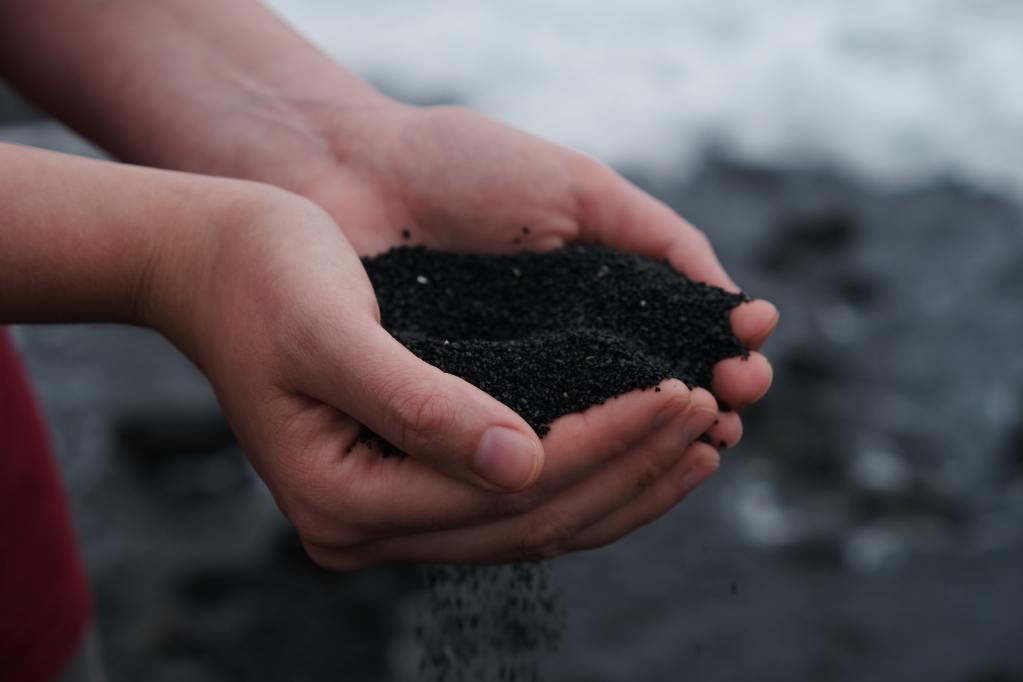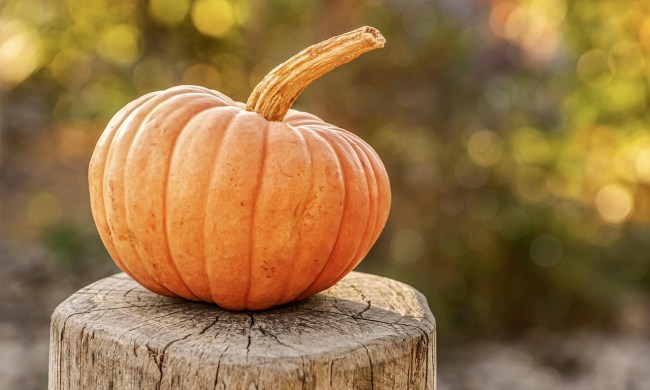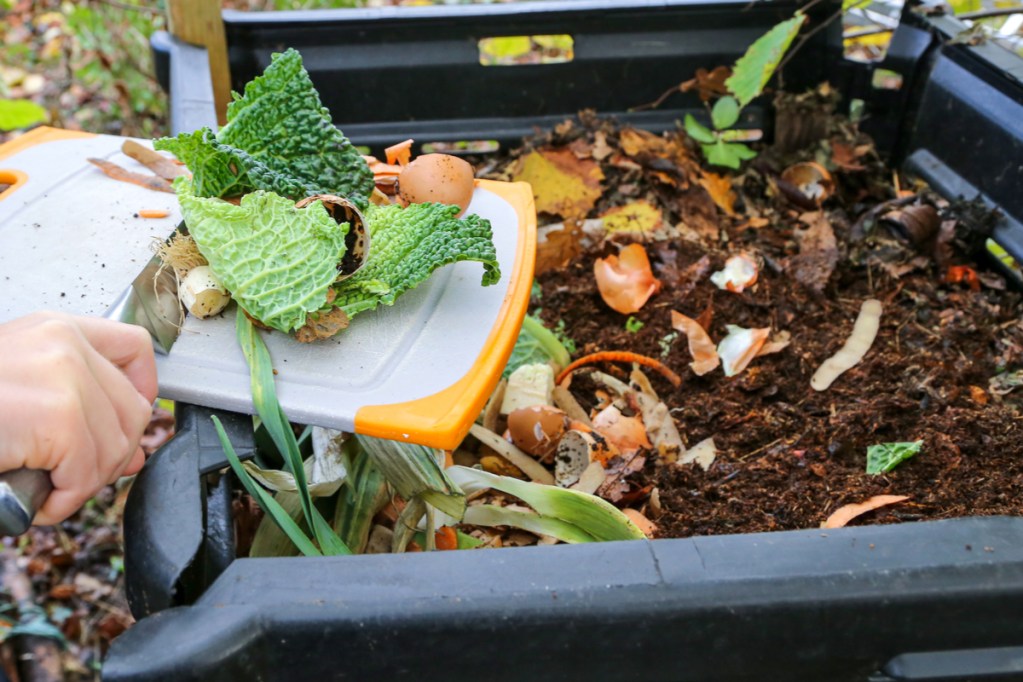
Composting is one of the easiest ways to make your own fertilizer for your garden. Sometimes, though, decomposition doesn’t smell very nice. While the earthy smell of healthy compost doesn’t appeal to everyone, it shouldn’t smell terrible. If your compost smells deeply unpleasant then it might be a sign that something is wrong with it. Luckily, these issues are easy to identify and fix! This simple guide will walk you through what to do when your compost smells bad.
Why does my compost smell bad?
Compost should smell mostly like dirt, or, at its worst, like a forest in fall. If your compost smells bad, there are a few different things that could be wrong with it. Here’s a rundown on what might be going on in your compost.
Moisture
The easiest problem to identify is too much moisture in your compost. If you had a lot of wet weather just before your compost started smelling, this is likely the issue. You can also identify this by sight and texture. Compost should be moist but not soggy.
Over-compacted compost
Another problem you can identify by sight and texture is over-compacted compost. If your compost is too compacted or too moist, it means your compost isn’t getting enough air, which is bad for your compost, but it also means that the smell has nowhere to go.
Compost that’s been too layered
Similar to becoming compacted, your compost might be too layered. The easiest way to detect this issue is by thinking about how you add matter to your compost bin. If you add a layer of leaves, vegetables, grass clippings, etc., then add a layer of soil on top of that and let it sit; this creates layers in your compost. Layers trap most of the decomposition in one place. This limits air flow and over time can lead to your bin becoming compacted, as well.
The contents of the compost
If your compost isn’t wet, compacted, or layered, the issue is likely in what you’re adding to your compost. When the issue is with what’s in the bin, you can typically determine the problem by smell. If your compost smells like ammonia, the problem is likely that your compost has too much green material. That means your bin has more vegetable scraps, grass clippings, and wet leaves than it does soil, straw, and dry leaves. Your compost may also smell if you’ve recently added manure or meat to it.
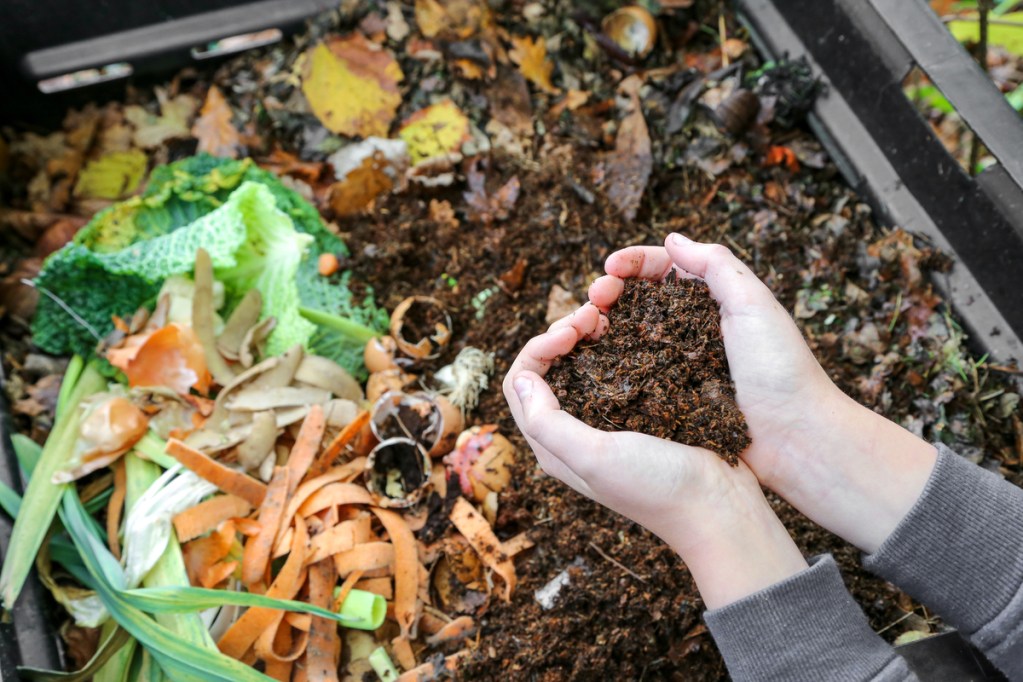
Does compost go bad?
Compost does not go bad. Or rather, it does, but it’s supposed to. Going bad is just another way to say rotting or decomposing, which is the purpose of a compost bin. The green matter you put into your compost bin goes bad, but the compost itself does not. Compost can be left for several weeks in your bin and stored for months as long as it is in a container of some kind with a lid. So you don’t need to worry about your compost going bad as in losing effectiveness, either.
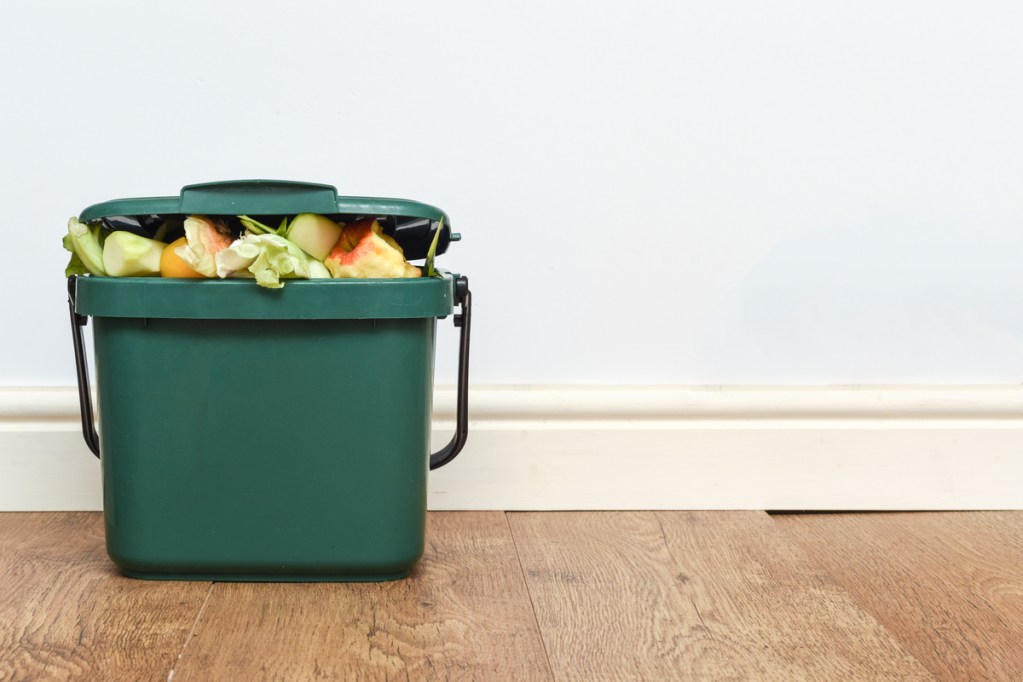
Can you stop compost from smelling bad?
Determining the cause of the smell is actually the hardest part. For most smells, there are two easy solutions: Turning your compost and adding brown material. If your compost is compacted or layered, turn your compost to add air into it. You can do this using a pitchfork, shovel, or your hands, depending on the size of your bin.
If you have too much green material, balance your bin by adding brown material. Brown material can be dry leaves or straw, newspaper, and soil. If your bin is too moist, do both. Add brown material to soak up the excess water, and turn it to mix the brown material throughout the compost and to help the water evaporate faster.
The exception to this are smells coming from recently added manure or meat. Unfortunately, animal products just smell bad as they decompose. If you add brown material over the meat or manure, you can smother some of the smell, but there isn’t much more you can do except wait for it to fully decompose. Cooking your meat before you add it to the bin helps to speed the process up.
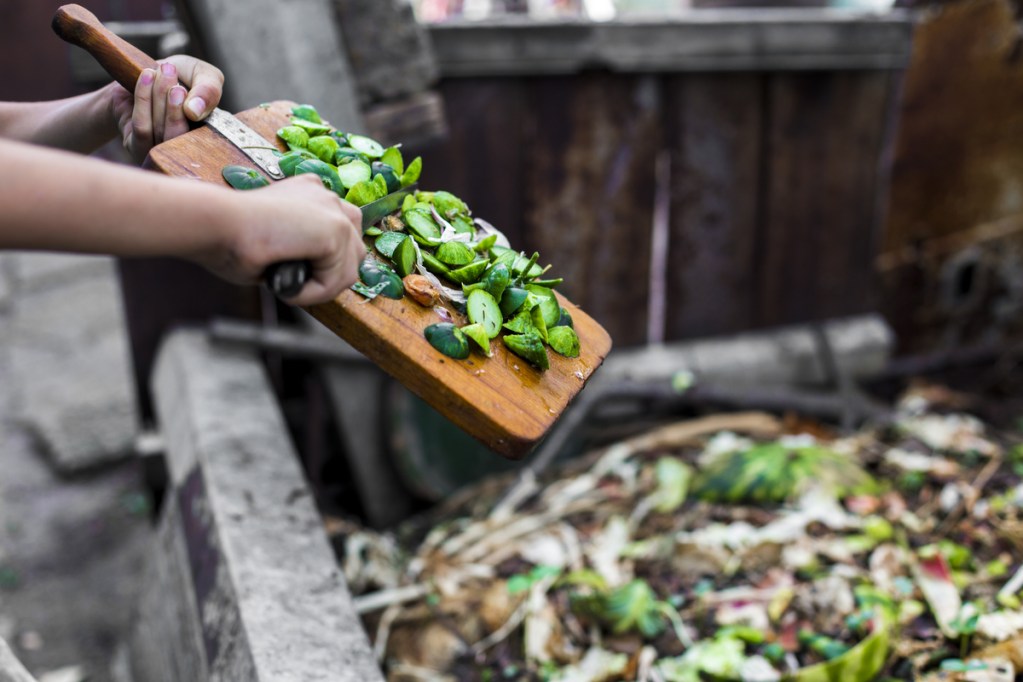
If it smells like ammonia
If your compost smells like ammonia, it means there is too much nitrogen and not enough carbon. To fix it, add material that is high in carbon, like shredded paper or wood chips. One way to avoid this problem is by adding a layer of high-carbon material after each addition of kitchen scraps.
The bacteria that convert plant waste into soil use more carbon than nitrogen, so keeping your compost balanced means adding plenty of brown ingredients. Greens include things like vegetable scraps, weeds, grass clippings, and coffee grounds. Brown ingredients are typically dry, and include autumn leaves, wood chips, paper, and non-glossy cardboard.
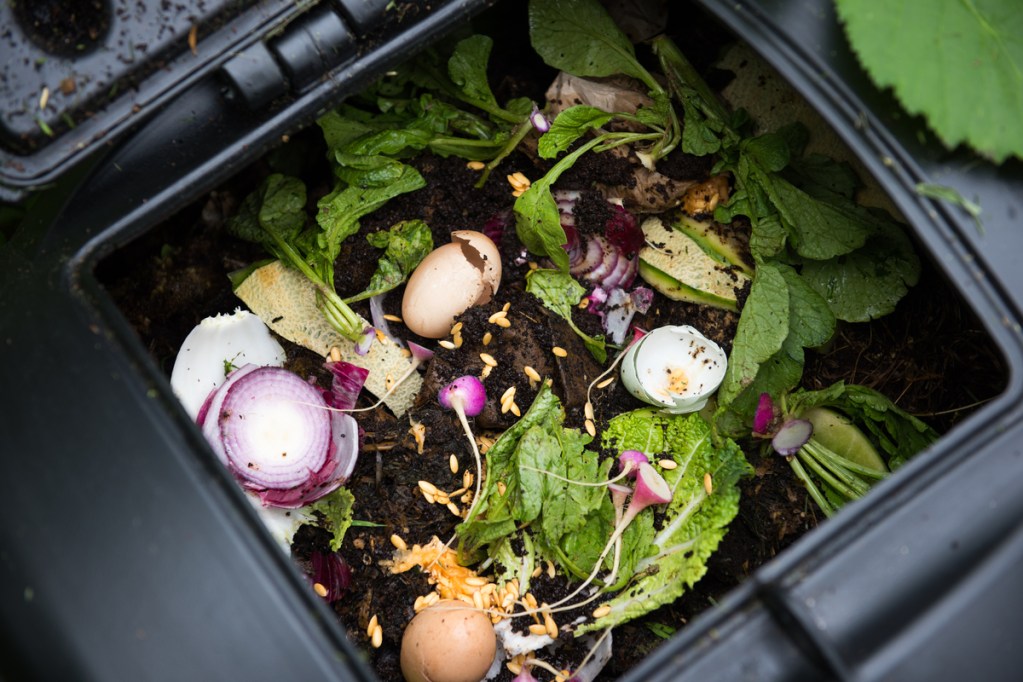
If it smells sour, rotten, or septic
A putrid rotten smell means the pile is likely too wet or possibly compacted. Add dry browns to absorb excess moisture, and turn the pile to infuse more air. One way to prevent this problem is by turning the compost regularly. In order to break down the compost properly, the microbes in your pile need oxygen and the right amount of water. Compost that is too dry, too compacted, or too wet will decompose more slowly. This is where the rotting smell comes from. Turn your compost regularly and give it just enough moisture to maintain the feel of a wet-but-wrung-out sponge. If your compost bin is outdoors, cover it with a tarp to keep excess rain off.
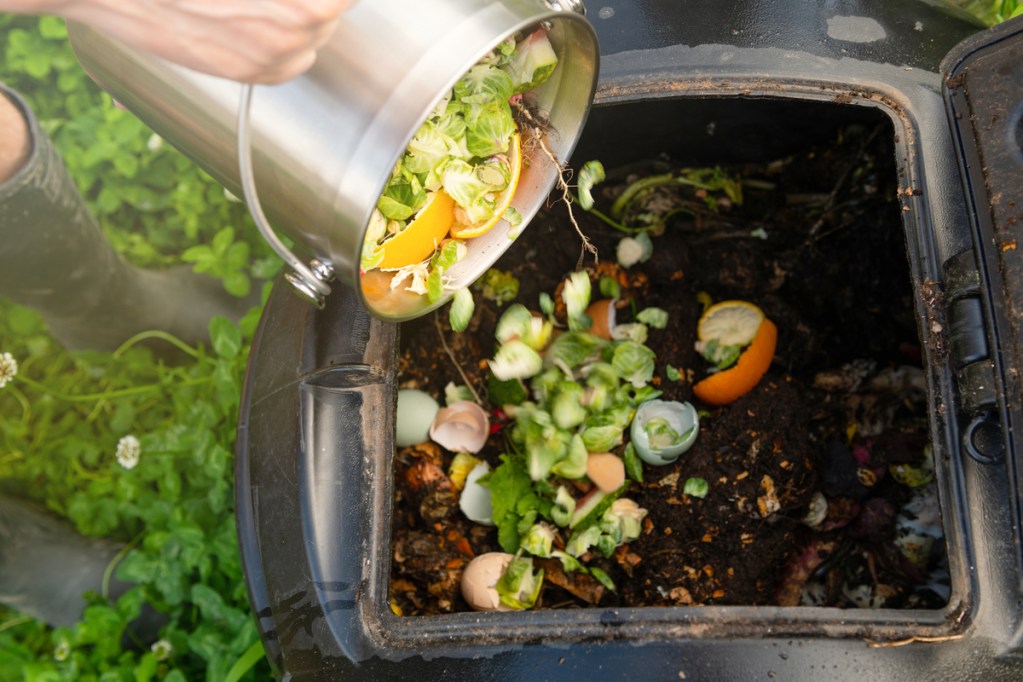
What it means if your compost smells sweet
Sickly sweet smelling compost can be caused by either a lack of air flow or an imbalance in the ratio of carbon to nitrogen. If your compost is compacted, it may begin to smell sickly sweet if you’ve added fruit or fruit peels recently. As the fruit rots, it releases a sweet smell. Turning your compost will help alleviate this problem. If your compost is not compacted then the sweet smell you’re noticing is likely ammonia. You’ll need to add more carbon-rich brown material such as paper or dried leaves to correct the imbalance. If your compost only smells a little sweet and not sickly sweet, then your compost is likely healthy! Healthy compost should smell earthy and slightly sweet, not unlike autumn leaves.
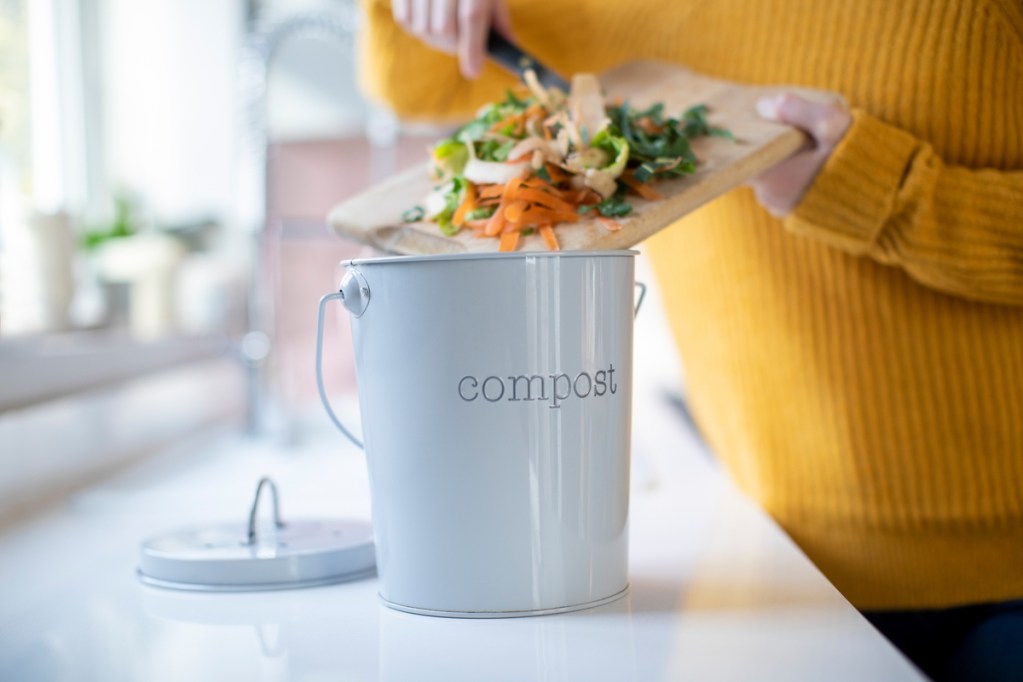
What you should (and shouldn’t) add to your compost bin
Compost needs a balance of green and brown material to be successful. Any vegetable scraps, grass clippings, and leaves are good to go into your bin, as long as they haven’t been treated with chemicals. Some leaves decompose faster than others, so steer clear of any evergreen plant material. You also want to avoid adding anything woody, like sticks, as they decompose very slowly.
Animal products like meat and manure can go into compost and actually add a lot of nitrogen into the soil, making them excellent to add if your soil is nitrogen-deficient. However, you should be aware that they smell, and meat can sometimes attract animals. If you add meat to your compost, make sure you have a tight lid on your bin, so critters don’t get into it. Additionally, be sure to cook the meat first to prevent the spread of harmful bacteria. Brown material is just as important as green material, but it’s important to make sure that your brown material is dry when you add it.
Most compost smells are avoidable and easily fixable, so no one needs to suffer through smelly soil. Just pay attention to what you’re adding and turn your compost, and you shouldn’t have any issues.
